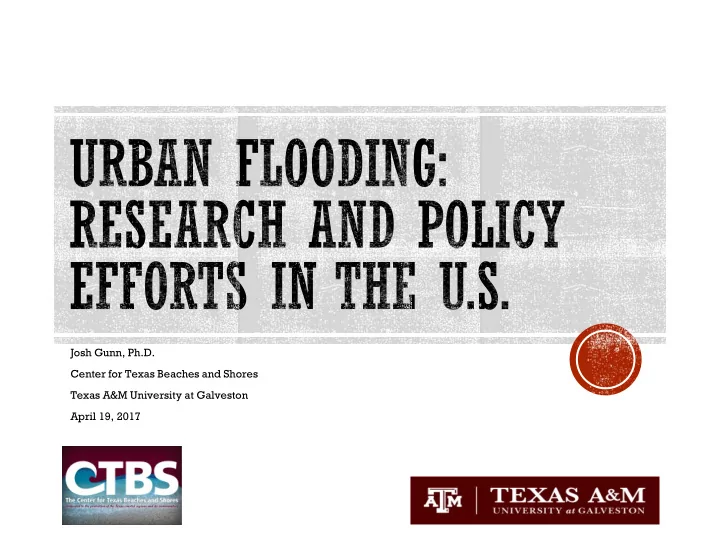

Josh Gunn, Ph.D. Center for Texas Beaches and Shores Texas A&M University at Galveston April 19, 2017
Introduction to team and NAS effort People Goals of project Urban flooding problem Defining urban flooding Previous research efforts Urban flooding trends in the U.S. Specific look at Houston Future work
Texas A&M University at Goals: Galveston Better understand the causes and costs of urban flooding Center for Texas Beaches and Shores Identify impacts to vulnerable populations University of Maryland Provide specific and targeted Center for Disaster Resilience policy recommendations to mitigate impacts of urban Hagler Institute for Advanced flooding Study at Texas A&M University National Academies of Sciences, Engineering and Medicine Program on Risk, Resilience and Extreme Events Policy and Global Affairs Urban flooding committee
Types of flooding: Narrow definition: flooding that can occur only in urbanized areas Fluvial – natural (rivers, lakes, (i.e. sewer backup; flooding due to etc.) or artificial (channel, hydrologic modification detention basin, etc.) that Stormwater management breach or overspill onto Channelization adjacent areas. Impervious surface Pluvial – heavy rainfall that exceeds natural or artificial Any exacerbation of normal drainage systems. hydrology Flash Flooding – extreme Broad definition: any type of rainfall on soils already flooding that occurs in urban areas saturated or with low permeability; can be a combination of fluvial and pluvial flooding upstream, but key is accumulation which causes flooding further down the watershed. Coastal – Tidal or storm surge in coastal or deltaic areas.
C HANGING F LOODPLAIN B OUNDARIES
A REAS S UBJECT TO P ONDING Source: City of Houston GIMS
“The Prevalence and Cost of Urban Flooding: A Case Study of Cook County, IL.” No correlation between damage payouts and floodplains 67% of zip codes with highest concentration of damage have below average income NFIP flood insurance represented only 10% of total payouts
NFIP Claims in Urban Areas Zone Number Percent SFHA 1075857 71.49% The NFIP dataset includes Non- residential property insurance SFHA 429105 28.51% claims for building and contents Total 1504962 100% damage from January 1, 1975 through December 31, 2014. It initially contained 2.068 million claims. Focusing on contiguous U.S. and data cleaning reduced this to 1.87 million Points were overlaid with 2010 U.S. Census that defined Urban Areas and points falling within this urban boundary were classified as urban. Of the 1.87 million claims, 81% (1.5 million) are designated urban.
There has been a total of over $60 billion in damage claims in urban areas (in 2014 dollars) since the National Flood Insurance Program’s inception, with over $15 billion of that occurring outside of the regulatory floodplain
The number of insured flood claims in urban areas is increasing over time
The majority of claims annually are in the $5,000 to $50,000 damage range; the second highest number of claims are under $5,000
1975-1984 1985-1994 1995-2004 2005-2014 Claims 19,916 12,041 23,514 30,028 SHFA Houston Dollars $551,592,016.86 $444,804,415.86 $950,934,969.94 $1,950,883,599.03 CBSA Claims 18,871 13,034 23,884 23,072 Non- SFHA Dollars $438,669,396.93 $323,740,957.45 $830,512,718.06 $593,127,698.68
Goals: Better understand the causes and costs of urban flooding Identify impacts to vulnerable populations Provide specific and targeted policy recommendations to mitigate impacts of urban flooding Need more data (and partnerships!) Have: NFIP IA, PA, Buyout, HMGP, SBA (zipcode, back to ~2000 Need: More spatially explicit data Further back in time Private insurance data
T HANK YOU The overall strategy is to keep the ocean surge out of Galveston Bay by using a coastal barrier (the Ike Dike) Before After Ike Ike
Recommend
More recommend